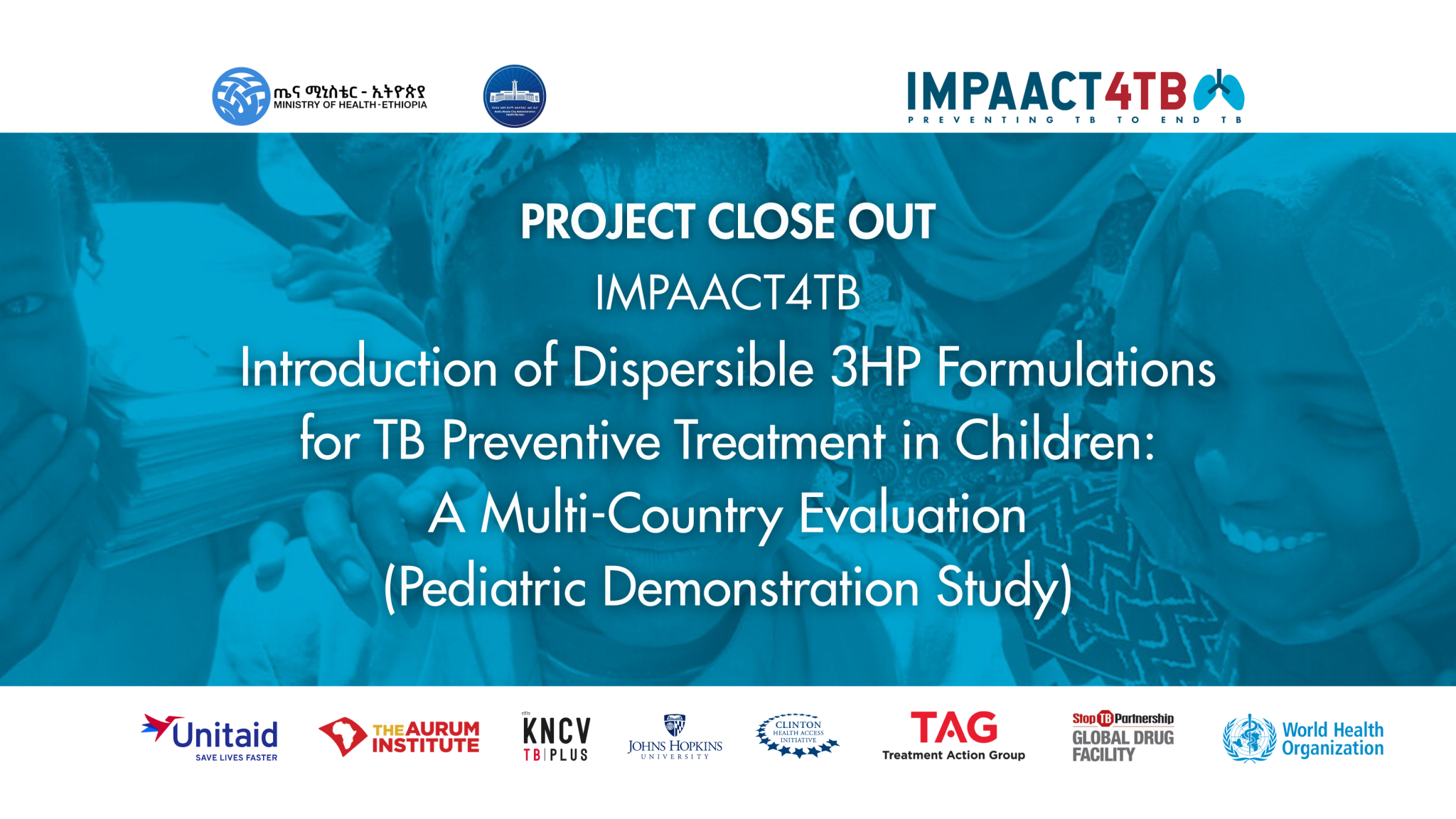3HP dispersible child-friendly formulation in Ethiopia, promising results
August 2025 marked the closure of the Pediatric Demonstration Study (PDS) in Ethiopia, part of the Unitaid-funded IMPAACT4TB project. The Closeout Workshop, hosted by KNCV TB Plus at Yatu Hotel in Bishoftu, brought together health leaders, TB care providers, caregivers, and community representatives to review progress and share lessons learned.

For years, the strategies to prevent tuberculosis (TB) disease in children have been determined by lengthy regimens and large, bitter pills that are difficult for children to take consistently. The Pediatric Demonstration Study (PDS), part of the Unitaid-funded IMPAACT4TB Project, tackled this challenge by utilizing a child-friendly formulation of rifapentine, presented as raspberry-mint flavored dispersible tablets.
Designed for a once-weekly, three-month regimen known as 3HP, this innovation has the potential to transform TB preventive treatment (TPT) for children into shorter, simpler, and more acceptable to both children and caregivers. In November 2024, Ethiopia received 360,000 dispersible rifapentine tablets following the request by the National TB Program (NTP) and arranged in-country distribution with the help of the Federal Ministry of Health (FMOH) and the Ethiopia Pharmaceuticals Supply Service (EPSS).
About the Closeout Workshop in Ethiopia
The workshop opened with remarks from a representative of the Addis Ababa City Administration Health Bureau (AACAHB)’s Health Promotion and Disease Prevention Directorate, who emphasized the importance of innovative approaches in sustaining TB prevention efforts. Participants included parents and caregivers, TB program officers from seven subcities, TB focal persons from 15 health facilities, and representatives of the AACAHB and the Addis Ababa City Administration Bureau of Finance (AACABoF).

Dr. Ahmed Bedru, Executive Director of KNCV Ethiopia, presented an overview of the study, highlighting its objectives, methodology, and key milestones:
- Engagement with 15 health facilities in Addis Ababa, as study sites in collaboration with AACAHB.
- 205 children enrolled in TPT, of which 163 on dispersible 3HP.
- Training and orientation sessions regarding dispersible 3HP regimen for TB care providers and all interest-holders across involved healthcare facilities.
- Oversight and troubleshooting of TB care facilities practice with the new dispersible 3HP formulation.

Additionally, during the study period, a project review meeting served to identify key barriers and trigger critical actions to 3HP scale-up:
- Boost active case finding to tackle low TB notification.
- Identify and fix bottlenecks and issues in the supply chain.
- Strengthen contact tracing and engaging family health teams to face weak contact screening and reduced partner support.
Preliminary findings shared during the event demonstrated encouraging outcomes and positive feedback from both providers and caregivers. The findings shared during the closeout workshop also underscored the importance of addressing practical barriers for future scale-up. Ensuring reliable access to clean water and mixing cups, providing clearer explanations around dosing differences between children and adults, and reinforcing the benefits of dispersible tablets to reduce perceived pill burden play a critical role in maximizing the impact of the child-friendly 3HP dispersible formulation and ensuring its successful rollout across Ethiopia.

Health providers involved in the study praised the new dispersible tablets for their ease of use and strongly recommended that the formulation be scaled up to all facilities across Ethiopia. A caregiver participating in the workshop testified to the benefits, sharing how her children enjoyed the taste of the tablets and completed their treatment smoothly. She expressed gratitude to her local TB clinic staff and to the project team for their support.
Additional observations were made from the qualitative findings of the study, including:
- There is a low awareness about TB transmission and prevention in the communities emphasizing the importance of increased dissemination of information about TB tailored to general audience.
- Participants emphasized the need for TB diagnostic tools to be available and accessible locally given its financial burden to the household.
- Family support facilitated adherence, with mothers playing a key role.
- Visits at the healthcare facility took into account school period and availability of children’s schedule.
- Caregivers and supporters made use of reminders and marked tools to ensure proper timing and dosage.
Final findings and analysis are currently being developed by the in-country and global team, and will be disseminated once they are ready.




The meeting concluded with reflections on lessons learned and a lively discussion on the way forward. Dr. Bedru, KNCV Ethiopia’s director, closed the event by thanking all partners and reaffirming Ethiopia’s commitment to expanding access to the child-friendly 3HP treatment.
With the closeout of the PDS, Ethiopia now joins other countries leading the way in demonstrating that shorter, child-friendly TPT regimens are both feasible and impactful. The hope among interest-holders is that these results will pave the way for broader adoption, ensuring that more children are protected from TB, the world’s deadliest infectious disease.